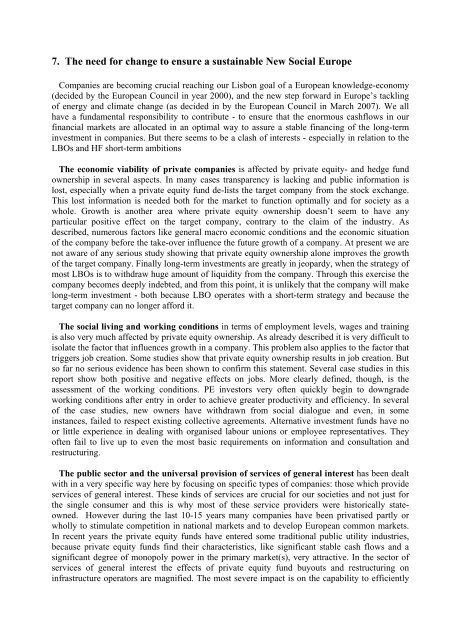Executive summary - Udo Bullmann
Executive summary - Udo Bullmann
Executive summary - Udo Bullmann
- No tags were found...
You also want an ePaper? Increase the reach of your titles
YUMPU automatically turns print PDFs into web optimized ePapers that Google loves.
7. The need for change to ensure a sustainable New Social EuropeCompanies are becoming crucial reaching our Lisbon goal of a European knowledge-economy(decided by the European Council in year 2000), and the new step forward in Europe’s tacklingof energy and climate change (as decided in by the European Council in March 2007). We allhave a fundamental responsibility to contribute - to ensure that the enormous cashflows in ourfinancial markets are allocated in an optimal way to assure a stable financing of the long-terminvestment in companies. But there seems to be a clash of interests - especially in relation to theLBOs and HF short-term ambitionsThe economic viability of private companies is affected by private equity- and hedge fundownership in several aspects. In many cases transparency is lacking and public information islost, especially when a private equity fund de-lists the target company from the stock exchange.This lost information is needed both for the market to function optimally and for society as awhole. Growth is another area where private equity ownership doesn’t seem to have anyparticular positive effect on the target company, contrary to the claim of the industry. Asdescribed, numerous factors like general macro economic conditions and the economic situationof the company before the take-over influence the future growth of a company. At present we arenot aware of any serious study showing that private equity ownership alone improves the growthof the target company. Finally long-term investments are greatly in jeopardy, when the strategy ofmost LBOs is to withdraw huge amount of liquidity from the company. Through this exercise thecompany becomes deeply indebted, and from this point, it is unlikely that the company will makelong-term investment - both because LBO operates with a short-term strategy and because thetarget company can no longer afford it.The social living and working conditions in terms of employment levels, wages and trainingis also very much affected by private equity ownership. As already described it is very difficult toisolate the factor that influences growth in a company. This problem also applies to the factor thattriggers job creation. Some studies show that private equity ownership results in job creation. Butso far no serious evidence has been shown to confirm this statement. Several case studies in thisreport show both positive and negative effects on jobs. More clearly defined, though, is theassessment of the working conditions. PE investors very often quickly begin to downgradeworking conditions after entry in order to achieve greater productivity and efficiency. In severalof the case studies, new owners have withdrawn from social dialogue and even, in someinstances, failed to respect existing collective agreements. Alternative investment funds have noor little experience in dealing with organised labour unions or employee representatives. Theyoften fail to live up to even the most basic requirements on information and consultation andrestructuring.The public sector and the universal provision of services of general interest has been dealtwith in a very specific way here by focusing on specific types of companies: those which provideservices of general interest. These kinds of services are crucial for our societies and not just forthe single consumer and this is why most of these service providers were historically stateowned.However during the last 10-15 years many companies have been privatised partly orwholly to stimulate competition in national markets and to develop European common markets.In recent years the private equity funds have entered some traditional public utility industries,because private equity funds find their characteristics, like significant stable cash flows and asignificant degree of monopoly power in the primary market(s), very attractive. In the sector ofservices of general interest the effects of private equity fund buyouts and restructuring oninfrastructure operators are magnified. The most severe impact is on the capability to efficiently





